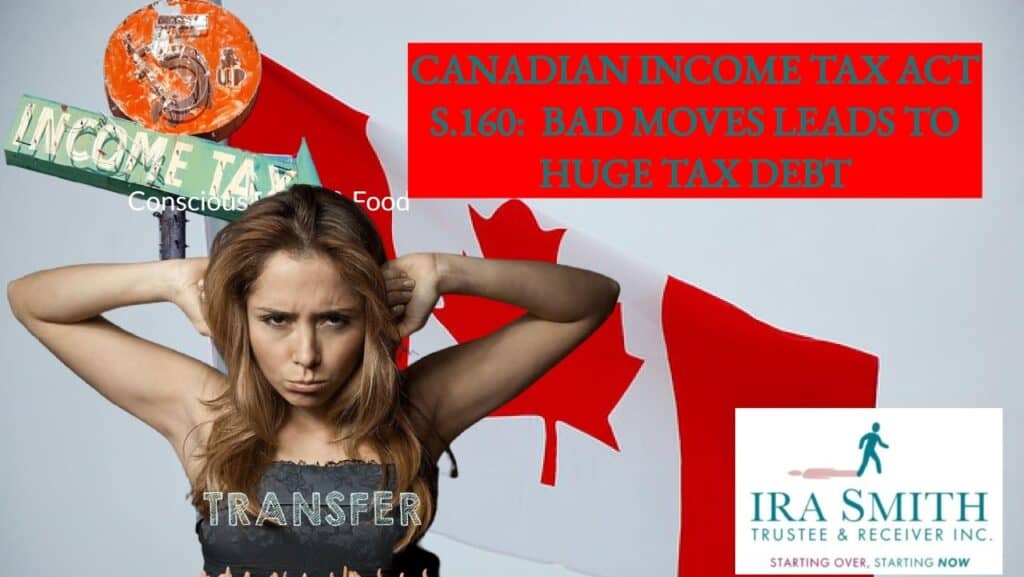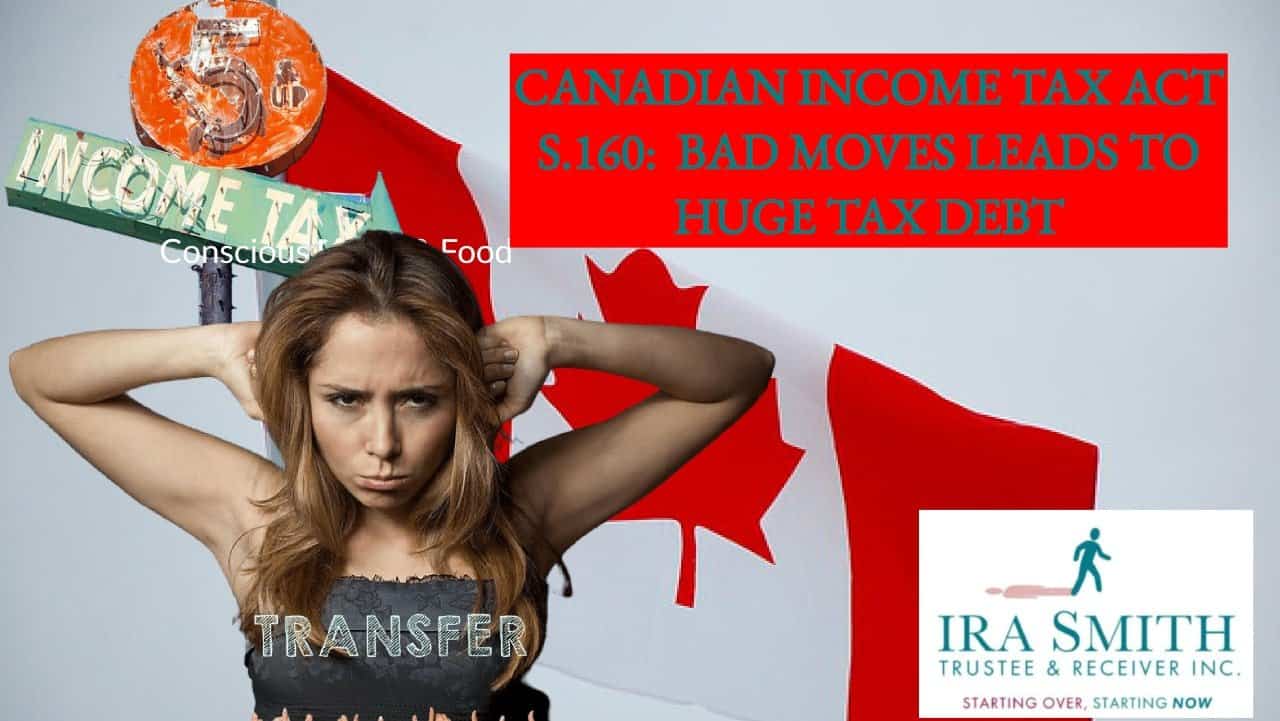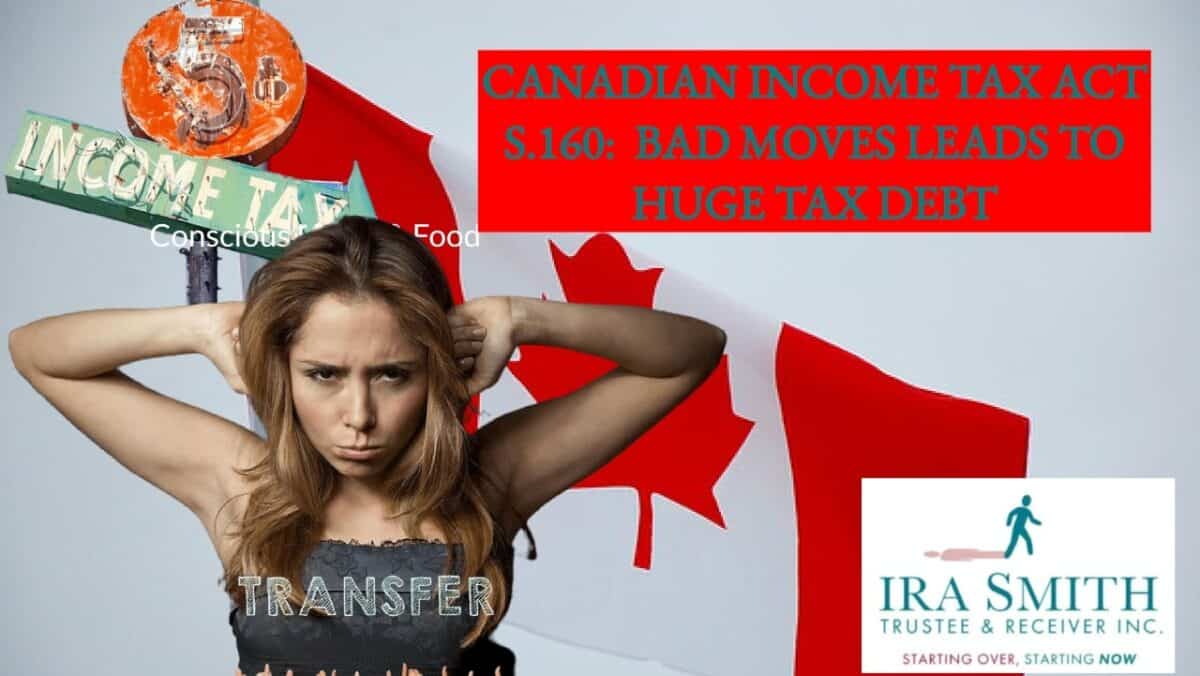Canadian Income Tax Act: Section 160 transfer of property
The Canadian Income Tax Act allows Canada Revenue Agency (CRA) to have a variety of methods for collecting debts from businesses. One option is to assess anyone who received money from the tax debtor business without proper consideration. This applies both if the business was a tax debtor when the money was paid out and if the business becomes a tax debtor after the payment is made.
Section 160 of the Canadian Income Tax Act is designed to let the CRA pursue people or companies who receive transfers of property when the person or company transferring the property owed, or could owe, amounts payable to the CRA and hasn’t paid them. The rule creates an income-tax debt for the person who got the transfer of property, without them having given adequate consideration for it.
For example, if an entrepreneur who is the major or sole shareholder of a company conducting business gave themselves a generous bonus in 2022, they may see that bonus clawed away by the CRA if the business is assessed as owing taxes for the 2022 taxation year or for a prior tax year. The potential tax liability could be sizable, so it’s important to be aware of this possibility.
This is what this Brandon’s Blog is about. We explain how section 160 of the Canadian Income Tax Act works and then describe a recent decision from the Federal Court in Murphy v. The King, 2022 TCC 111 (CanLII).
What’s section 160 of the income tax act?
The goal of the current legislation of Section 160 of the Canadian Income Tax Act is to stop taxpayers from avoiding paying taxes by transferring property to someone who is a non-arm’s length transferee. CRA is of the view that rather than transferring the asset, the taxpayer should sell the asset to pay off their income tax debt. A transfer deprives the CRA of the ability to collect taxes by seizing the asset.
Section 160 becomes effective when:
- a person (or company) has transferred property, directly or indirectly, through a trust or any other means, to their spouse or common-law partner, or to a party they are not dealing with at arm’s length; and
- the party making the transfer owes income tax or is assessed at a later date to owe income tax for the taxation year or prior to the transfer taking place.
Section 160 of the Canadian Income Tax Actis designed to cover a wide range of transactions involving a party related to the tax debtor. This includes many types of transactions, such as:
- A direct transfer to a related party, such as an outright gift to a spouse or child, or a dividend from a corporation to a shareholder.
- An indirect transfer of property to a related party may occur when the property is first transferred to an arm’s-length party and then the same property is transferred to a non-arm’s length party.
- A transfer of property to a trust where the beneficiaries of the trust are non-arm’s length parties.
- A transfer to a related party by any other means whatever, just in case the above wording missed a specific transfer.

canadian income tax act
What is the third-party tax liability under Section 160 for the transferee?
If section 160 of the Canadian Income Tax Act applies, both the person making the transfer and the person receiving the property become jointly and severally liable for the original tax debtor transferor’s income tax debt. So, the original tax debtor remains liable for the tax debt, but the recipient now becomes independently liable as well. The CRA can now go after both the original tax debtor and the recipient for the same income-tax debt. The claim by CRA against transferees are known as derivative assessments.
The recipient’s tax liability under section 160 cannot be greater than the fair market value of the transferred property. If any amount was paid or another consideration given in return for the property reduces the amount the recipient owes CRA on account of the original tax debtor transferor’s tax liability.
As stated in section 160 of the Canadian Income Tax Act, when the original taxpayer who transferred the property makes a payment to CRA, it will discharge the liability to the extent of the payment.
It also states that when the taxpayer who received the property makes a payment, their liability is reduced by that amount. This also lowers the amount the taxpayer owes. To get rid of the recipient’s liability completely, the taxpayer receiving the property needs to pay an amount that equals or is greater than the fair market value of the property they received.
Is it possible to dispute a Canadian Income Tax Act Section 160 CRA Assessment?
You could fight CRA’s notice of assessment and collection action first by filing a notice of objection. If that proves unsuccessful, you could take it to court, but you’re not likely to win. In the next section, I describe a recent Tax Court decision where the taxpayer fought it in court – and lost. The taxpayer then appealed the lower court decision and the appellate court refused to hear the appeal. So I’m a licensed insolvency trustee, not a tax accountant or tax legal professional, but here’s my understanding of section 160.
Section 160 of the Canadian Income Tax Act is pretty harsh. There’s no due-diligence defence, it applies even if the transfer wasn’t motivated by tax avoidance transactions, and it catches transferees who don’t even realize that they’re receiving property from a tax debtor with an outstanding tax debt.
Section 160 of the Canadian Income Tax Act doesn’t have a time limit or limitation period, so the CRA could come after you years after the supposed transfer. And even if the original tax debtor is later discharged from bankruptcy and doesn’t owe the tax debt anymore, the person who got the property would still be on the hook.
As an aside, I wonder if the transferee could get out of their liability if the taxpayer fully completed a successful proposal – like a consumer proposal or Division I. But this is just a thought, not related to this Brandon’s Blog post.
Further, the unpaid tax debt liability under section 160 can be passed on – just like the common cold or COVID! After being assessed for a tax obligation under s.160, you can spread out the suffering if you then transfer property to yet one more taxpayers who are non-arm’s length persons to you. The CRA may come after you for the tax bill, and now someone else!
The only defences I am aware of available to the transferee against this are to prove that:
- the transferor didn’t owe anything to CRA at the time of transfer;
- that the recipient gave fair market value for the property in return; or
- the property’s fair market value is zero (this will presumably be impossible because if it was really worthless, the transfer was unnecessary).

canadian income tax act
Murphy v. The King, 2022: The court upheld the third-party income tax liability under section 160 of the Canadian Income Tax Act
This case is all about an appeal to the Federal Court of Appeal of a 2018 decision of the lower court, upholding the notice of assessment issued by the Minister of National Revenue (the “Minister”) dated June 7, 2017, pursuant to section 160 of the Canadian Income Tax Act in respect of dividends paid by 591985 British Columbia Ltd. (the “Corporation”), in December 2015 to Mr. Murphy, the Appellant. Coincidentally, Mr. Murphy is a licensed insolvency trustee.
At that time, the Appellant was the only director and the controlling shareholder of the Corporation. The Corporation had a tax liability which, on June 7, 2017, was $109,460.96. This amount represented the total federal and provincial taxes owing, plus penalties and interest.
The question that needed to be answered is whether the Appellant is jointly and severally liable for the $109,460.96 the Corporation owes under section 160 of the Canadian Income Tax Act.
Although the lower court went through a purposive analysis and is detailed, the lower court’s decision was ultimately based on one key issue. This issue is important not only for cases involving the transfer of property or for taxpayers experiencing financial difficulty and having an unpaid tax debt, but also for all entrepreneurs.
It’s not uncommon for entrepreneurs to bonus themselves through dividends instead of salaries. In this case, Mr. Murphy argued that the fair market value of the services he provided to the Corporation was equal to or greater than the amount transferred. He argued that, since he gave market value consideration for the property in question, he should not have any liability under subsection 160(3) of the Canadian Income Tax Act.
The Tax Court and the Federal Court of Appeal was not buying this argument. The Judge referred to the fact that Canadian courts follow a Supreme Court of Canada decision in support of the fact that market value consideration has nothing to do with it when considering this liability provision in the context of the transferred property being dividends.
The Supreme Court of Canada’s decision held that a dividend is related to shareholding and not to any other consideration the shareholder might have provided. The fact that the Appellant declared the dividends on his personal income tax return and paid taxes on them does not impact the fact that dividends are not paying for services. Therefore, the lower court decision finding joint liability was upheld.
This is an important point for all entrepreneurs, whether facing a liability assessment under section 160 or not. Dividends are related to shareholding and not to any other consideration the shareholder might have provided, according to the Supreme Court of Canada’s decision. This means that shareholders are only entitled to the dividend if they continue to hold their shares. If they sell their shares, they are not entitled to the dividend.
Perhaps if Mr. Murphy had received a salary from the Corporation in return for the services provided, then all he would have to prove is that the services provided had a value equal to or greater than the underlying tax debt of the Corporation. Perhaps the lower court or the Federal Court of Appeal would have ruled differently. But that is not what he did, so, no sense speculating further on such legal questions.
The Canadian Income Tax Act and your income-tax debt to CRA
I hope you found this Canadian Income Tax Act Brandon’s Blog informative. Is CRA taking collection action against your or your company, including seizing bank accounts?
If you’re an entrepreneur, it’s not uncommon to use unremitted employee source deductions and unremitted HST to finance the businesses of corporate taxpayers during tough economic times. However, falling behind on your CRA payments can create large tax debt that can be difficult to recover from. Although unpaid income tax is not a Director’s liability, unremitted source deductions and GST/HST become a personal liability for tax of the Directors of the company. It is generally too late to protect yourself or try to restructure your financial affairs, once CRA is hounding you with the collection remedies available to them.
As people’s take-home pay fails to keep pace with inflation and mounting financial debt, many people are having a hard time keeping their heads above water. This is also a crucial concern dealing with entrepreneurs and their businesses, as profits, as well as cash flow, are challenged and perhaps even evaporating. In these troubled economic times, it is necessary to be knowledgeable about these concerns as well as take action to shield yourself and your company.
Are you now worried about just how you or your business are going to survive? Are your creditors taking collection efforts and you cannot afford to pay your or your company’s debts? Those concerns are obviously on your mind. Coming out of the pandemic, we are now worried about its economic effects of inflation and a potential recession.
The Ira Smith Team understands these concerns. More significantly, we know the requirements of the business owner or the individual that has way too much financial debt. You are trying to manage these difficult financial problems and you are understandably anxious.
It is not your fault you can’t fix this problem on your own. The pandemic has thrown everyone a curveball. We have not been trained to deal with this. You have only been taught the old ways. The old ways do not work anymore. The Ira Smith Team makes use of new contemporary ways to get you out of your debt problems while avoiding bankruptcy. We can get you debt relief now while explaining our recommendations.
We look at your whole circumstance and design a strategy that is as distinct as you are. We take the load off of your shoulders as part of the debt settlement strategy we will draft just for you. Whatever process we recommend for you, we will do so in order to minimize any cons you may experience.
We understand that people facing money problems require a lifeline. That is why we can establish a restructuring procedure for you and end the discomfort you feel.
Call us now for a no-cost consultation. We will listen to the unique issues facing you and provide you with practical and actionable ideas you can implement right away to end the pain points in your financial life, Starting Over, Starting Now.




